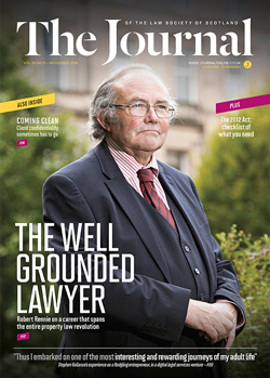Into the unknown

In January 2008, in those halcyon days before the recession hit, I sold the legal practice that I had spent the first 20 years of my professional life building. I was at that time a little burned out from 10 very profitable years of high-volume conveyancing. Some of you might even remember the articles that I wrote shortly afterwards (“Time to sell up?”, Journal, June 2008, 44; July 2008, 46).
What should have been a happy moment passed with little celebration. I was glad to be leaving a profession that I felt was overregulated and apparently reluctant to embrace change. In the following years I went on an interesting journey that brought me into contact with many different sectors of Scotland’s business community.
At 53, I now find myself back with a practising certificate. In my current role at HM Connect, the legal referral network owned by Harper Macleod, I am again engaging with my profession. After several years of hearing about, and sometimes predicting, the end of the high street solicitor, I see that the local firm is far from dead. Indeed many are again beginning to thrive.
I was, by many accounts, the lucky one. Just six months after I stopped practising, the crunch hit. My previous practice saw an immediate drop in income, followed by a round of sweeping redundancies. Many practices at the time simply went into hibernation mode, surviving on executry and ancillary areas of work and cutting expenditure to the core. By 2009 the profession was not in a good place, and with ABS on the horizon there was little but doom and gloom predicted.
2008-2014 – a legal odyssey
My own journey in the meantime took me to the universities, where I felt that I could perhaps utilise some of my skills and experiences as a tutor on the Diploma in Legal Practice. It opened my eyes to the plight of the graduates, most now having to fund their Diploma places at a cost of about £7,000.
After demanding more and more lawyers through the early 2000s, the big firms’ requirement for trainees plummeted overnight. A failure on many levels, and a clear indicator that there is something wrong in the way we plan for future entrants. The human cost was obvious, with many graduates being lost to the profession.
I also started to look at that time at developing an online business. Not a legal firm, but a business that provided legal knowledge and simple processes directly to the public. In essence, a company through which simple wills could be prepared. With all the talk of ABS at the time, I was interested to explore which areas in fact you required to hold a practising certificate for, and what could be done without one.
I also was fortunate enough to become involved with a very philanthropic organisation, Entrepreneurial Spark, where my fledgling business was based.
Thus I embarked on one of the most interesting and rewarding journeys of my adult life. My business partner was an IT guy, and from him I learned about direct marketing, websites, application development and how the public buy online. From Entrepreneurial Spark I received a masterclass on mindsets and behaviours, lessons that many legal firms would benefit from.
Most successful business people demonstrate certain common characteristics. For some, like a good golf swing, these are natural. For others, they can be practised and learned. E-Spark brings together young businesses and sometimes not so young entrepreneurs, and accelerates them through an intense six-month course, hoping to make them viable within a year. Ultimately it is about helping you adopt and improve your business mindsets and behaviours.
Digital: are the public ready?
At that time, a number of factors came together with results that I had never anticipated. My experience with Diploma students showed there was an educated and diligent workforce available that simply wished to obtain some experience of legal work. Entrepreneurial Spark provided me access to low-cost offices and assisted me with introductions to many institutions, none of which I would have dreamed of being able to interact with in my previous life. The internet gave me access to potentially low-cost marketing. In brief, all of the elements that should have been required for a business to succeed.
My new business though had mixed results. Its successes were that it counted amongst its clients a FTSE-100 company. Through it a number of Diploma graduates gained work experience and all, I believe, went on to obtain traineeships. Another is that the website is still receiving over 1,000 hits a day, though largely for things other than wills.
The number of online wills sold, though, was small. We experimented with a number of avenues, including buying Google words – an interesting gamble where you spent the next day waiting to see whether the money spent by Google-driven customers would be more or less than the money you had spent buying these clicks.
Even our attempts to create an affiliate marketing model failed to drive the required traffic numbers through the checkout. The system ultimately evolved more into a wills drafting aid for a small band of people who wished to sell wills to the
public directly.
The journey demonstrated several things to me. Notwithstanding all the profession’s fears, the public are not, in my opinion, yet ready to trust personal legal matters to a solely online system. They still require a degree of human interaction, assurance almost, to give them the confidence to push the “buy” button at the end. Alternatively, without a huge marketing budget it is not yet possible to reach sufficient numbers of people to achieve a tipping point and make the system viable.
Online is also a challenging place for small businesses, particularly law firms who often are technophobes. Few solicitors seem yet to realise that building a great website is like building a shop in the Sahara. Nobody will find it without lots and lots of signposts. These signposts in the digital world can be expensive and/or time consuming. In any event, online shops generally only do well if you are “the cheapest” or “the best”, a message few small to medium sized firms are able to offer.
Ultimately I decided that the returns for the effort were not worthwhile, and perhaps the billions I had hoped to make would be more wisely spent by the next budding legal entrepreneur. The journey, though, brought me to my current position here at HM Connect, where I’m involved with a thriving legal referral network.
Back to the future
I now find myself in the privileged position of spending time with some of the 250 member firms at HM Connect, assisting them with their legal queries and learning about them and their businesses. HM Connect provides not only a free-to-join referral network but assists with outsourcing needs and perhaps, most importantly for many, a support network for the issues they face on a day-to-day basis.
From this I am beginning to see patterns emerging.
Over the last five years, as a profession we didn’t lose our clients, they were simply dormant. Our profession, which has suffered worse than most, is beginning to see a gradual and increasing improvement as clients themselves become more economically active. The improvements are not universal. As I travel primarily round the west of Scotland, I’ve noted that our firms very much reflect their local communities, and the best and worst performing firms are generally in the most and least economically prosperous areas.
There are some additional variations. As holders of general practising certificates, even in the face of global Armageddon, we stuck, by and large, to the areas of law that we knew. Many, as I stated earlier, just cut costs and survived, while waiting for the recession to pass.
A few, though, acquired different skillsets and attacked new markets. They in particular are coming out of the recession in better shape than most. Some targeted areas of law unaffected by recession; others, areas that perhaps were not traditionally seen as the remit of solicitors. A few are utilising new social media services to raise their profile and to spread their message to an ever widening pool of potential clients.
There are still challenges ahead. We are an aging profession. Having survived the recession, firms are now having to look at the challenges around succession planning. As a support network, this is a theme at HM Connect that we are happy to discuss.
My biggest fear for the future, though, is that as profits increase we, as a profession, will not invest in the future of our businesses. The online and ABS challenges are real and will come, maybe just not quite as quickly as some predicted. Will we prepare ourselves for them by creating robust, client-centred, vibrant practices, or will we grab the profits and leave the issues for the next generation to resolve?
In this issue
- Age before duty
- Title to tissue
- Standing the test of time?
- Adjudication: a risk of abuse?
- Courts in all but name
- When is a person a “relevant person”?
- Reading for pleasure
- Opinion: John Scott QC
- Book reviews
- Profile
- President's column
- People on the move
- The designated day is here
- A tale of two systems
- LBTT: the rules and rates emerge
- The price of probity
- Play to your strengths
- Into the unknown
- A changing landscape
- Get the basics right
- Holiday pay: give us a break
- Money into thin air?
- Pathways to justice
- Flesh on the bones
- Scottish Solicitors Discipline Tribunal
- Streams of thought
- Over the finishing line
- Over the finishing line (full version)
- Law reform roundup
- The path less travelled
- The right kind of risk
- Frauds and scams – increasing awareness
- Ask Ash
- The process engineer's tale
- To disclose or not to disclose?






